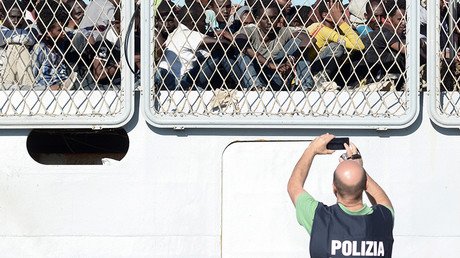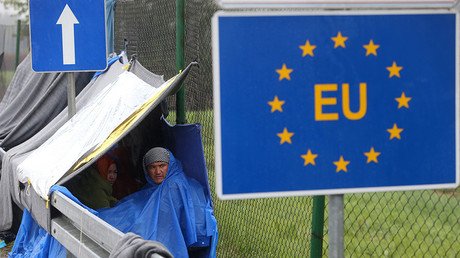‘Refugees to Europe are easy prey for Islamic radicalization' - Italian police chief
In the case of Islamic terrorism, a phenomenon that is of a global nature must be kept under control, while the Red Brigades phenomenon was typically national, Gianni Tonelli, Secretary of the Italy's Independent Police Union, told RT.
This week, EU interior ministers discussed ways to tackle the migrant crisis and to remove some of the burden falling on Italy, which is the main arrival point for newcomers from Africa.
In just a matter of days, up to 12,000 people have landed in Italy while more than 85,000 have arrived since the start of this year.
Italy's top anti-Mafia prosecutor believes the crisis has created a security threat. However, despite Italy accepting the biggest number of migrants, it has thus far been spared from the ravages of terror attacks.
RT discussed the possible reasons for this curious situation with Italian police chief Gianni Tonelli.
RT: Are there any techniques that you have adopted from your experience of fighting mafia that you use against terrorists?
Gianni Tonelli: This fight against the mafia and internal political terrorism has taught us many things. But these are two completely different issues. The Red Brigades (our internal political terrorism of the '70s) were very coordinated and acted on the input of the leaders and the organization as to who decided attacks. In the case of Islamic terrorism, we are faced with an ambivalent phenomenon. On the one hand, we have a "brain," on the other hand it is the very organization of Islam that ... produces many "lone wolves" that can intervene autonomously with a high degree of fanaticism.
Of course, we have acquired some experience, but these are two completely different worlds. In the case of Islamic terrorism, a phenomenon that is of a global nature must be kept under control while the Red Brigades phenomenon was typically national. It is clear that our experience in the fight against organized crime, the mafia and the Red Brigades has been very useful.
RT: Were there cases when a terror attack was foiled thanks to the surveillance through social networks?
GT: Yes, it happened. But the control we do on the web is inadequate. In Italy, security equipment has been greatly reduced by economic cuts. In our staff there are 45,000 less staff than is required. This heavy reduction has hindered investigative, preventative and territorial control activities.
RT: ISIS listed the Italian mafia as their number one foe back in 2016. Does the mafia actually help in some way to tackle the issue of terrorism? How exactly?
GT: This ISIS statement does not come to me. It sounds very strange. The mafia is quite happy with the problem of Islamic terrorism. For example. In Sicily, where the mafia has its absolute power, in the last ten years we have had a cut of 4,000 policemen. Today, the few cops who are still fighting the mafia are employed for the emergency of migrants - 24 hours a day! The mafia is happy, it feels much less the pressure of the investigators and the police. I do not understand what the conflicts between ISIS and the mafia are.
On radicalization
RT: Talking about prison context, do you think there is Islamic proselytism in the Italian prisons?
GT: Sure there is. The easy prey for Islamic radicalism are desperate men. The Islamic man who has arrived in Italy, who has been integrated, and has a job and has succeeded in guaranteeing a future for his children, is not easily influenced by Islamic radicalism. The desperate man is willing to do all he can to redeem himself. For these men to be sacrificed for the 'Holy War' means social redemption and being respected.
RT: How does the monitoring of Islamic radicalism take place in Italian prisons?
GT: We try to keep everything under control, but the means are very limited. It's not easy, too, because many of these individuals are in prison for petty crimes. For this reason, they are not isolated and are in contact with other detainees. So it is difficult to control them, but it is easy for them to come into contact with extremist elements.
On international cooperation
RT: Why has Italy been spared from terrorist attacks?
GT: When the emergency of immigrants began, I explained that there was no health filter and there was no security filter. I said terrorists could come and hide easily. If we reflect on foreign elements traveling to Europe, we realize that it is difficult to distinguish the economic migrant, the political refugee or the terrorist.
RT: How big is the problem of radicalized imams in Italy? Do Italian police follow them closely?
GT: Is a very serious problem. In Italy this problem is not adequately addressed. Unfortunately, Italy has not yet dealt with a process of uniting the core points for the community. Particular interest prevails on the collective interest.
The statements, views and opinions expressed in this column are solely those of the author and do not necessarily represent those of RT.














